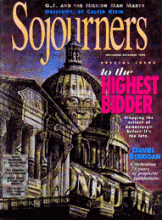The way we finance elections undermines our ideals of representative democracy. Because only the wealthy (or those beholden to wealthy interests) can run for office, we have an unrepresentative Congress. Minorities and women have less chance of being elected because they can't raise the money, don't have the money, or don't want to become beholden to the interests that can provide it.
Our system of private money politics establishes an institutional bias of unequal representation. Because elected officials are dependent on "big" money for their campaigns, our elected officials are naturally more responsive to those interests. Particularly in these days of budget cuts and down-sizing of government programs, our system of campaign contributions is buying a "budget buffer" for the wealthiest contributors. The voices of those who can't or don't give are muted by the dollar power of those who do give. Almost all members of Congress-whatever their original aspirations in seeking office-ultimately come around to representing the views of those who pay for their campaigns, if only to rationalize their continued service in Congress on behalf of "the people."
The impact of the private financing of our public elections is felt not just in paying more than our fair share in taxes, and not just in skewed policy-making. Because candidates are required to raise large amounts of money to wage competitive campaigns, today's money and politics system has distorted our American democracy. It has created a de facto
system of first-class constituents who've won super-rights based not on fairness or justice or anything other than their ability to deliver campaign funds.
Read the Full Article

